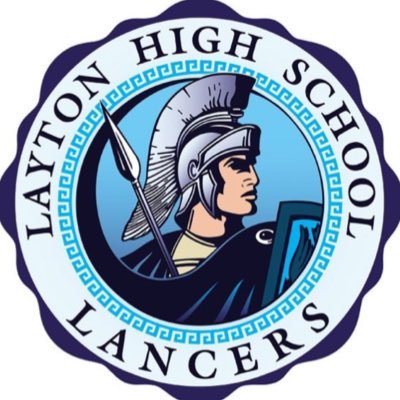
Layton High School receives $10,000 to support events during “Pride Week”; district mandates that schools allow transgender students to use their preferred restrooms and locker rooms
Incidents
In 2022, the “It Gets Better Project” allowed schools to “apply for up to $10,000 in grant funding to support school-based projects empowering LGBTQ+ students.” The project was called “50 States. 50 Grants. 5000 Voices.” The organization specifically pointed out that “grant funding” even went to schools in “traditionally conservative areas.” Layton High School is a school that applied for a grant and received a full $10,000. The “It Gets Better Project” stated:
We are so excited to finally be able to announce all of the grant recipients, with each school receiving the full $10,000 in funding. Fifty grants are being awarded in 40 states plus Washington D.C., including many traditionally conservative areas. Submissions were received from a wide range of small rural towns, average-sized suburbs, and large urban cities.
The organization claimed that these grants were made available to schools thanks to the “generous support of American Eagle Outfitters, Inc. (AEO) through American Eagle and Aerie customer donations from all 50 states via their Real Rewards loyalty program, as well as in-store pin-pad promotion during Pride Month 2021.” In reference to Layton High School, the “It Gets Better Project” vaguely explained how the grant money “will support a series of events during Pride Week.”
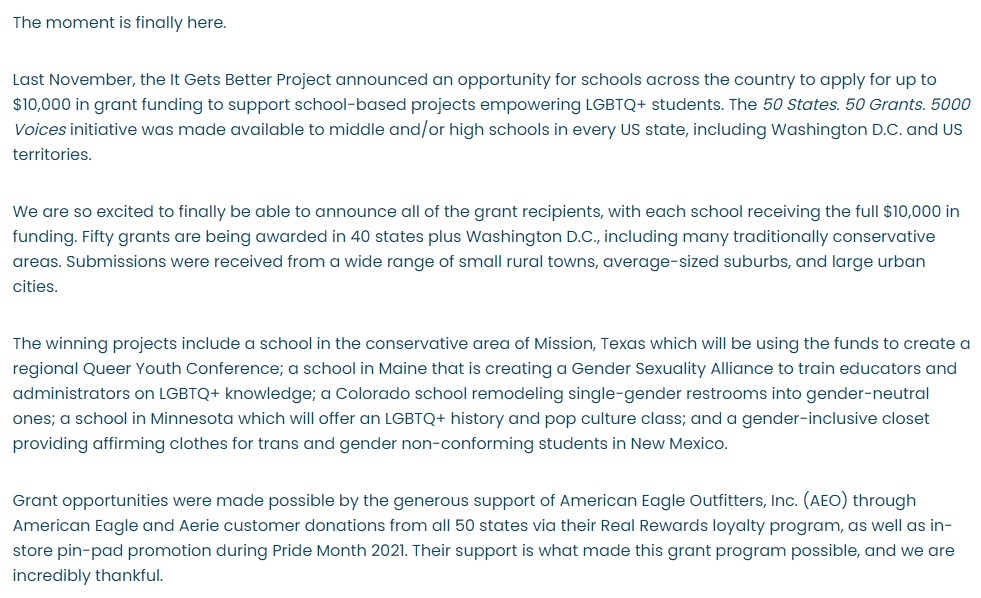

The “It Gets Better Project” is an organization that promotes LGBTQ issues to children. The organization states that its mission is “to uplift, empower, and connect lesbian, gay, bisexual, transgender, and queer (LGBTQ+) youth around the globe.” This includes through “storytelling and media.” The organization explains: “We work in all forms of media to bring messages of hope to LGBTQ+ youth, spark conversations about the challenges they confront, and inform and positively influence their sexual orientation and gender identity journey.”
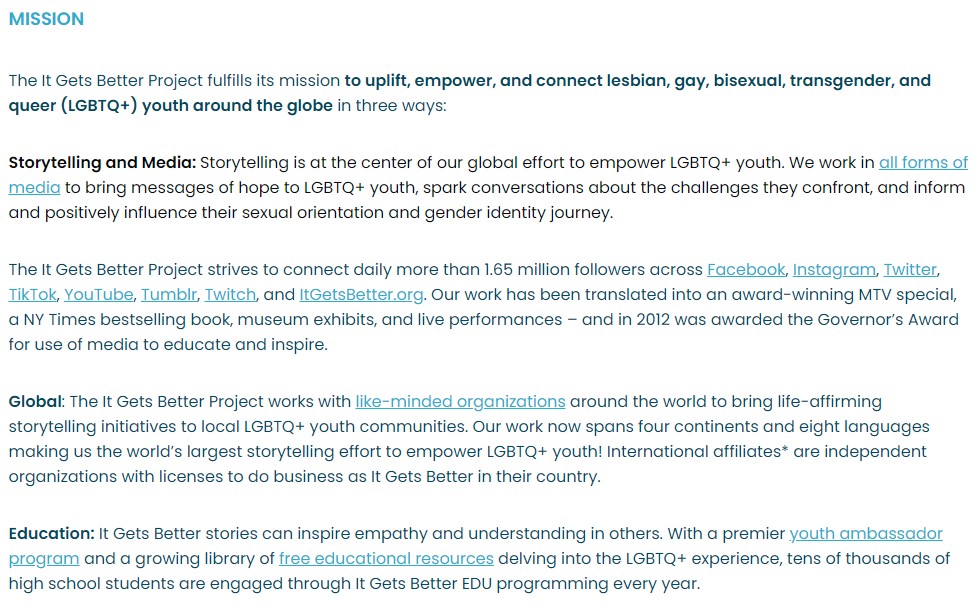
The school’s district – Davis School District – has a page online titled “School-Based Protocols.” Under a section labeled “LGBTQ+” on this page, the school district provides policies for “transgender students” to ensure that “all students are treated equitably and with dignity at school.” The page provides definitions for the terms “gender identity,” “gender expression,” and “transgender.” The district describes “gender identity” as “a person’s deeply held inner sense of psychological knowledge of their own gender regardless of the biological sex they were assigned at birth.”
The district also explains that schools should help students transition. The district states on the page: “If school staff believe that a gender identity issue is presenting itself and creating challenges for the student at school or if a student indicates an intention to transition, the school should make every effort to work with the student and the parents.” The district further explains that “the school should work with the family to best accommodate the student’s needs at school and put in place measures for supporting the child and creating a sensitive supportive environment at school.”
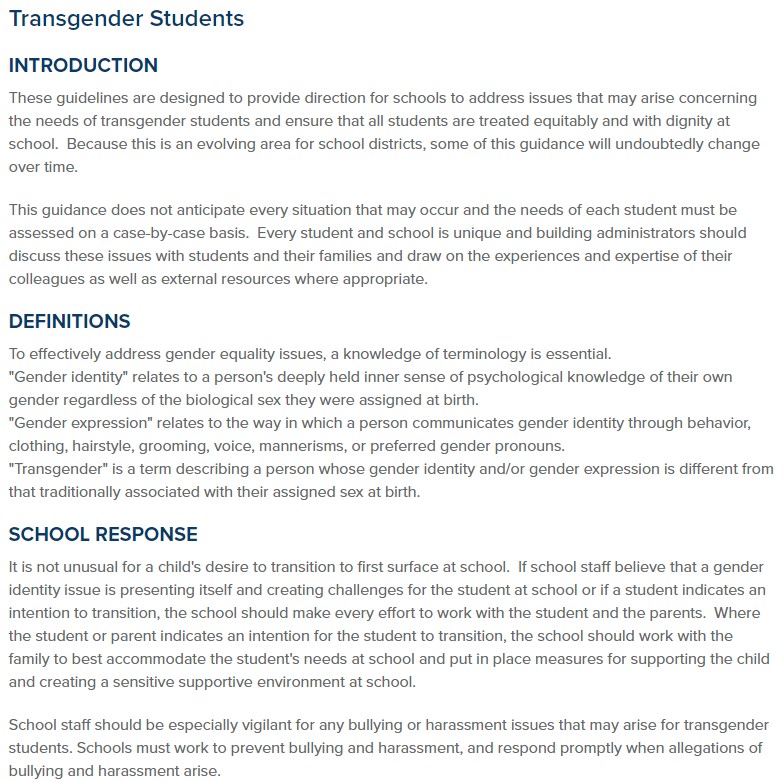
The school district also mandates that schools “should use the name and gender, including pronouns, preferred by the student” when “the school is not legally required to use a student’s legal name or gender on school records and other documents.” Records that can be changed to fit a student’s preferred pronouns and name include yearbooks, school ID, and “daily assignments.”
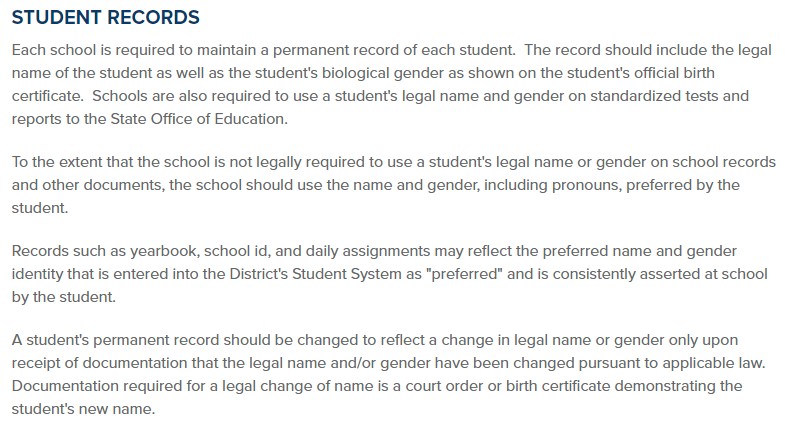
The school district additionally mandates schools to allow transgender students to use their preferred restrooms and locker rooms. The district explains: “A transgender student should not be required to use a locker room or restroom that conflicts with the gender identity consistently asserted at school by the student.”
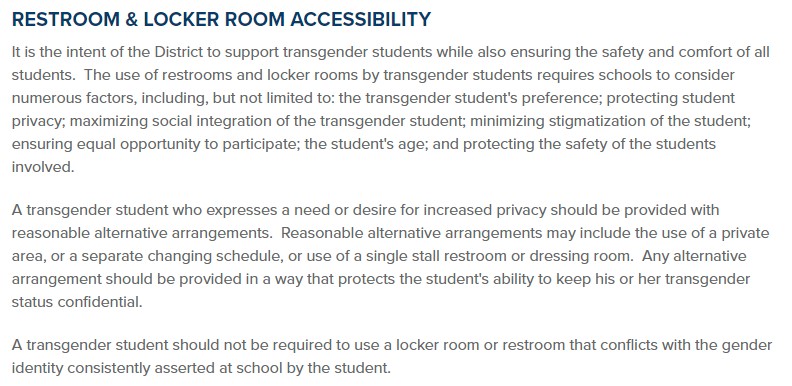
The school district also mandates that schools allow students to “participate in physical education and intramural sports in accordance with the student’s gender identity that is consistently asserted at school.” This is an effort to ensure that “transgender students are to be provided the same opportunities to participate in physical education as are all other students.”
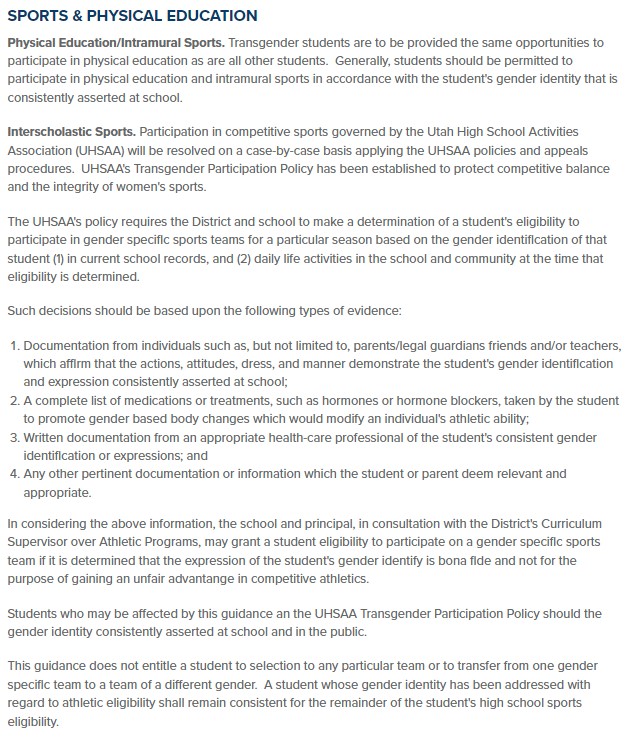
The school district’s website has a page titled “Community Resources.” One section on this page is also labeled “LGBTQ+.” Resources listed under this section include groups that target youth on LGBTQ issues, such as “Utah Pride Center,” “Encircle,” and “Family Acceptance Project.”
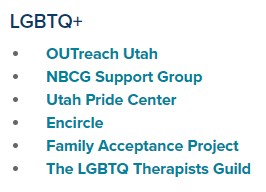
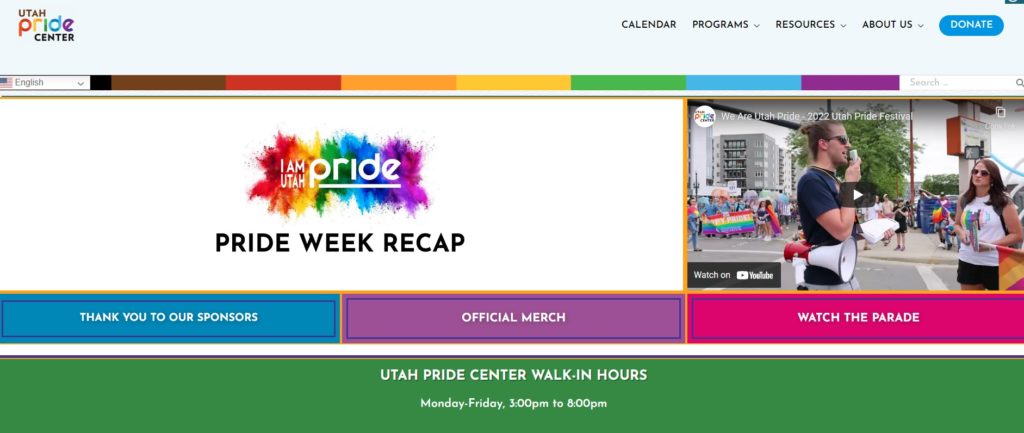
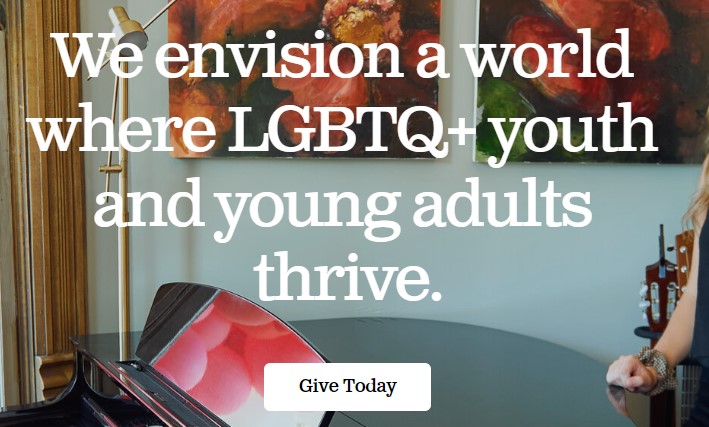
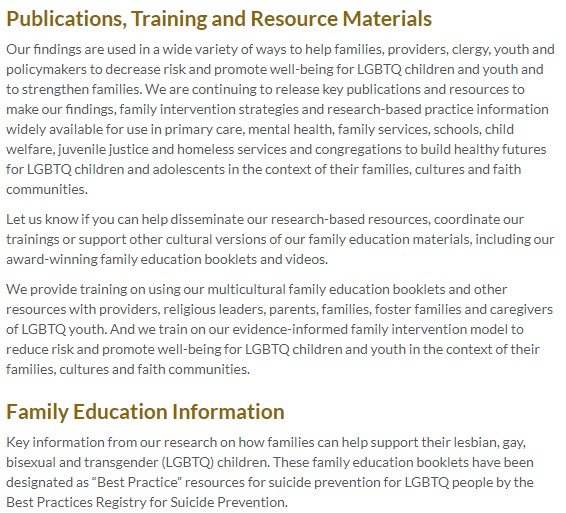
The school district has an article posted on its website titled “DSD discusses racial equity with coaches and staff.” The district then brags that it “introduced a documentary about racial injustice and bias to more than 100 coaches and staff.” The event was described as “part of the district’s commitment to inclusivity and racial equality.”
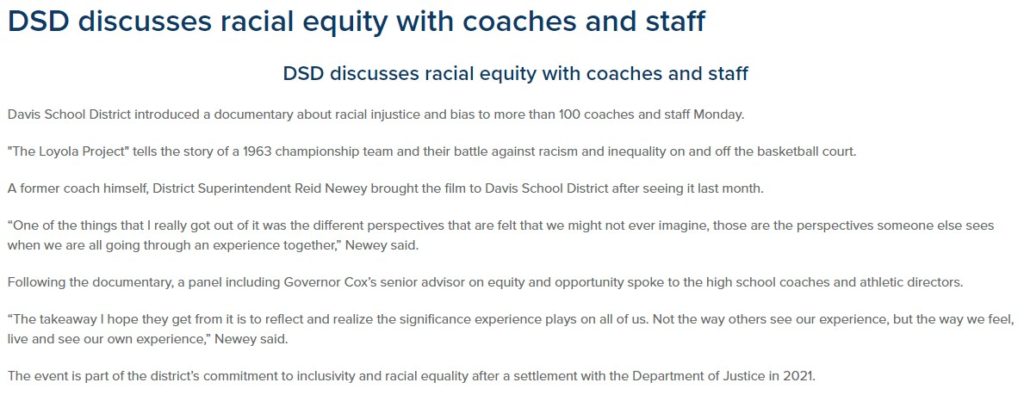
The school district also has an article posted online titled “District appoints Office of Equal Opportunity Director.” The district then provided a quote from this new director promoting “social justice”: “I am very passionate about social justice and working to continue to help establish equity for all students. That’s why I wanted to be in this position because it affords me the opportunity to make a difference.”
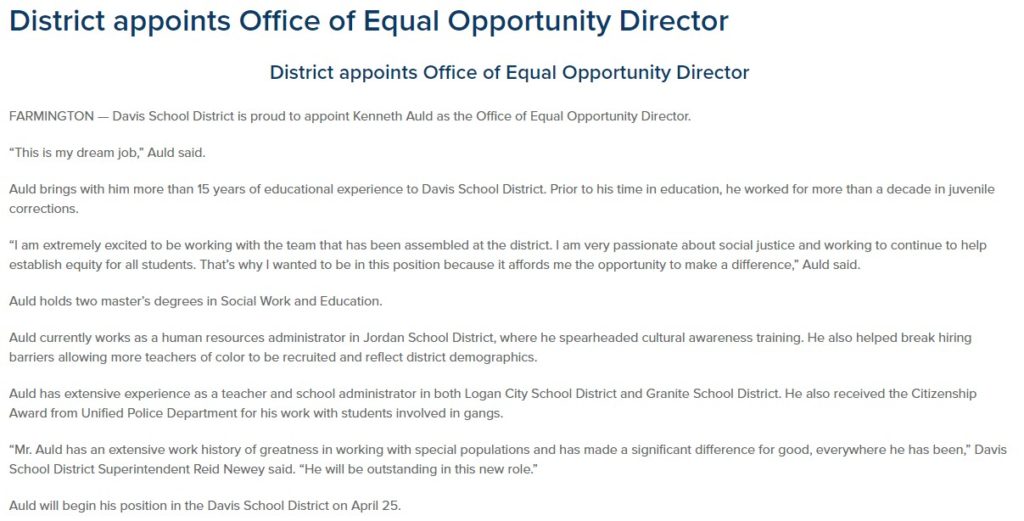
The school district’s website has a page dedicated to “Educational Equity.” The district appears to explain on this page that teachers were participating in “anti-bias training” until May 19, 2021. The school district explains:
Consequently, to provide the time and space for this work to be done as advocated by Governor Cox, Utah State Board of Education, and the Utah State Education Interim Committee, Davis School District will suspend the Community Building Pilot as well as employee anti-bias training as of May 19, 2021. Davis School District looks forward to clear and concise guidance from the Utah State Board of Education in the coming months. With such guidance, the Davis School District will then examine the appropriate course of action.
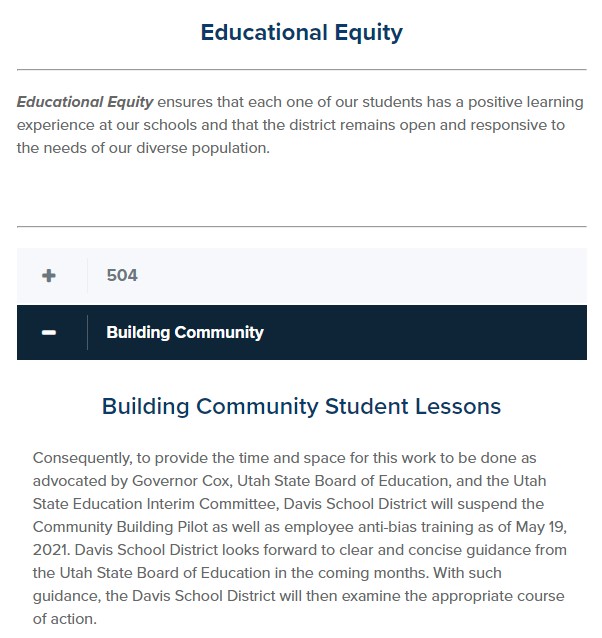
The school district has a page online titled “Equity Family and Community Night.” The following flyer is posted on the page for the district’s 2019 “Equity Night”:

The school district has a page online titled “Parent Equity Committee.” The district explains that this committee has a mission to “address diversity in the educational process by fostering positive school cultural through ongoing training of district employees and community partners in ESL, REACH, and courageous conversations.”
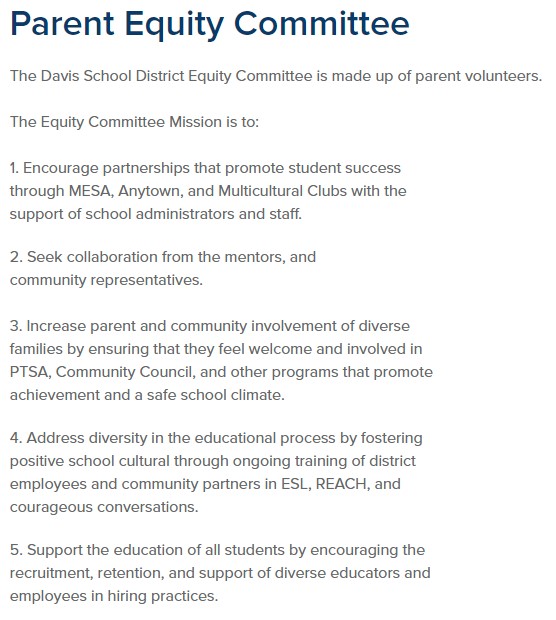
The district also promotes an education program called “Respecting Ethnic and Cultural Heritage (REACH).” This program has “basic principles” that consist of “culture is something everybody has” and “building cultural bridges.” The school district explains that “REACH is a nationally recognized multicultural education program being disseminated throughout the United States, Canada and Australia” and that “it has been approved as a National Diffusion Network Program (NDN) to be used in grades 6-9 Social Studies Classrooms.” The district further explains:
REACH is a multicultural education program designed for infusion into all areas of the regular Core Curriculum. The program intent is to increase knowledge and understanding related to cultural diversity in the United States while simultaneously reducing social distance between groups.
This program intends to teach students “cultural self-awareness.” The district states: “Each student engages in extensive research related to his/her culture, family, or community and then produces a large visual project to be displayed at a Cultural Fair.” The program also intends to teach students “multicultural knowledge.” This means that “American history is presented in a way that adequately reflects the experiences and contributions of Asian American, African Americans, Hispanic/Latino Americans, Native American people, and European Americans.” Additionally, the program will have students “engage in learning activities which help them gain in-depth knowledge of the history and culture of different ethnic groups.”
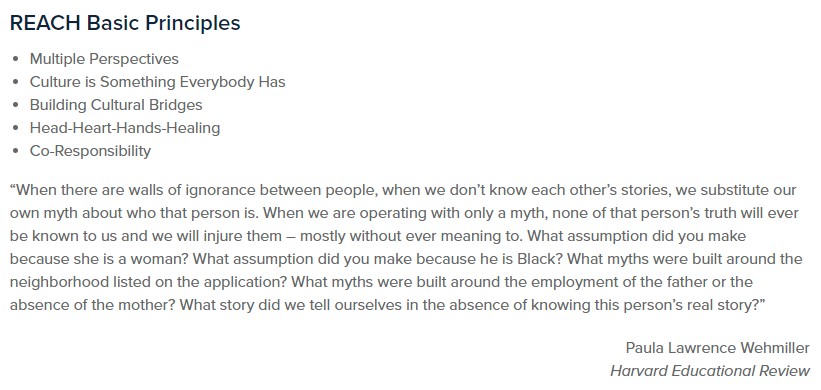
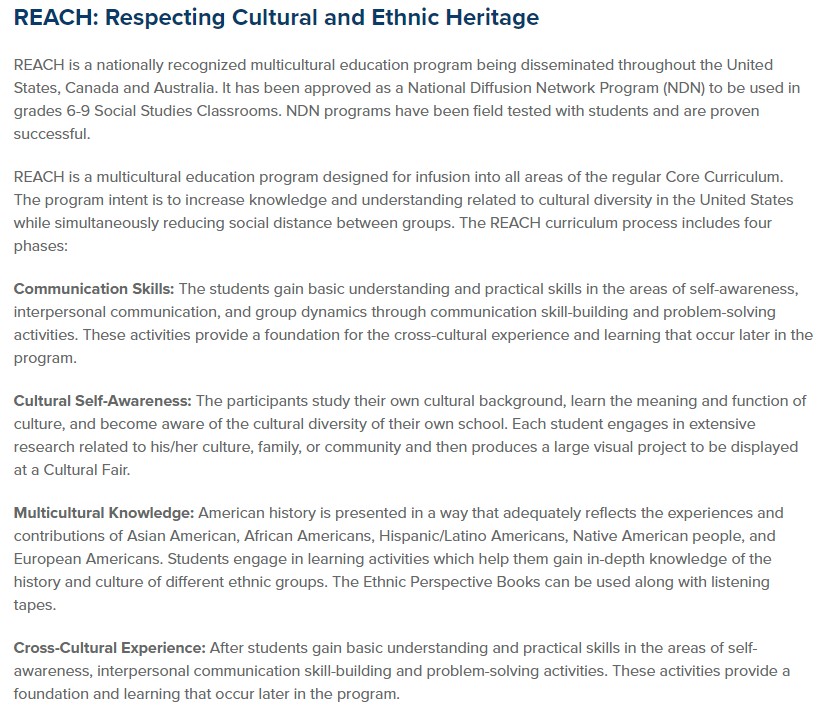
In a stakeholder report, the school district explains that “the Educational Equity Department has been working in conjunction with the Davis School District Professional Learning and Quality Teaching department and Weber State University to provide Implicit Bias Training to preservice student teachers.” The district further explains in the report:
This year, the district has expanded the focus and direction of diversity training. Since January 2020, the department has provided training in 54 elementary schools, 15 junior high schools, seven high schools, and eight departments with 13 additional schools scheduled. It has also provided 15 additional trainings specific to school requests. Training for the School Cultural Liaisons has increased to include presentations from USBE and the Educational Equity department. The hope is to provide ongoing, organized conversation with school leaders to talk about equity in their school communities.
The report also mentions the school district’s Social Emotional Learning (SEL) Department and how this department showed webinars from CASEL to “all faculty and staff.” The district explains in the report:
The SEL Department produced and provided a number of resources addressing various needs during the school soft closure and into the new school year. These resources included webinars, videos, PowerPoint, scholarly articles to address trauma sensitive practices, physical exercise demonstrations and strategies for schools and families. Additionally, a variety of self-care and partner webinars with CASEL, Pure Edge, and Sanford Harmony have been promoted to all faculty and staff.
CASEL is an organization that works with school districts throughout the country to use SEL in an effort to push “equity” and “social justice” in education. On July 1, 2020, CASEL promoted “racial justice” in discussing its roadmap for reopening schools during the COVID-19 pandemic. In explaining the importance of the reopening process for schools, the organization stated that “this moment called on all members of our school communities to deepen our social and emotional competencies and create equitable learning environments where all students and adults process, heal, and thrive.” CASEL also published a video in 2020 titled “SEL As a Lever for Equity and Social Justice.”
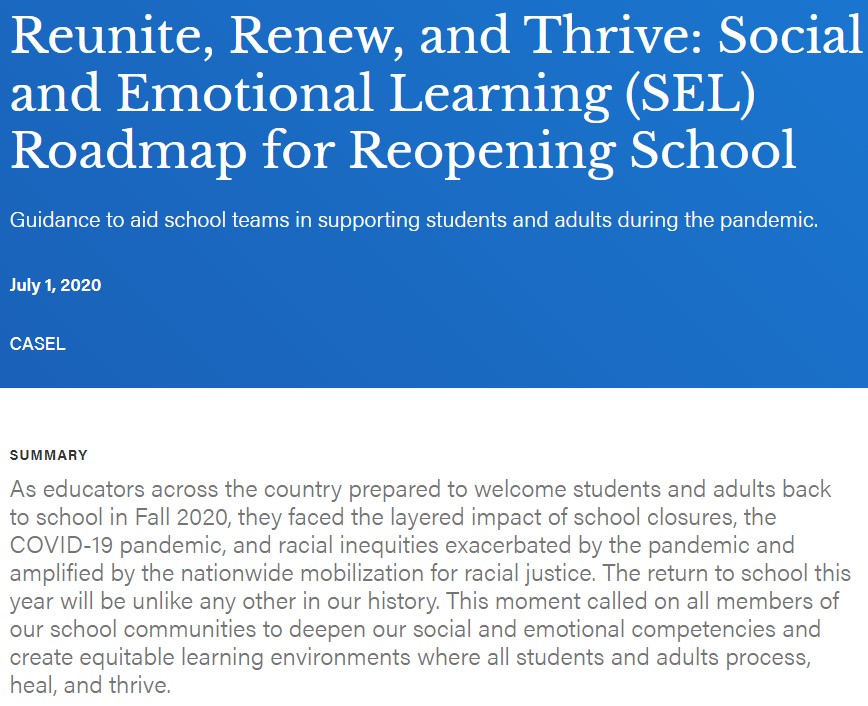
The school district’s website has a page dedicated to SEL resources. One resource is a presentation for district staff that includes links to additional CASEL resources.

Stay Informed
